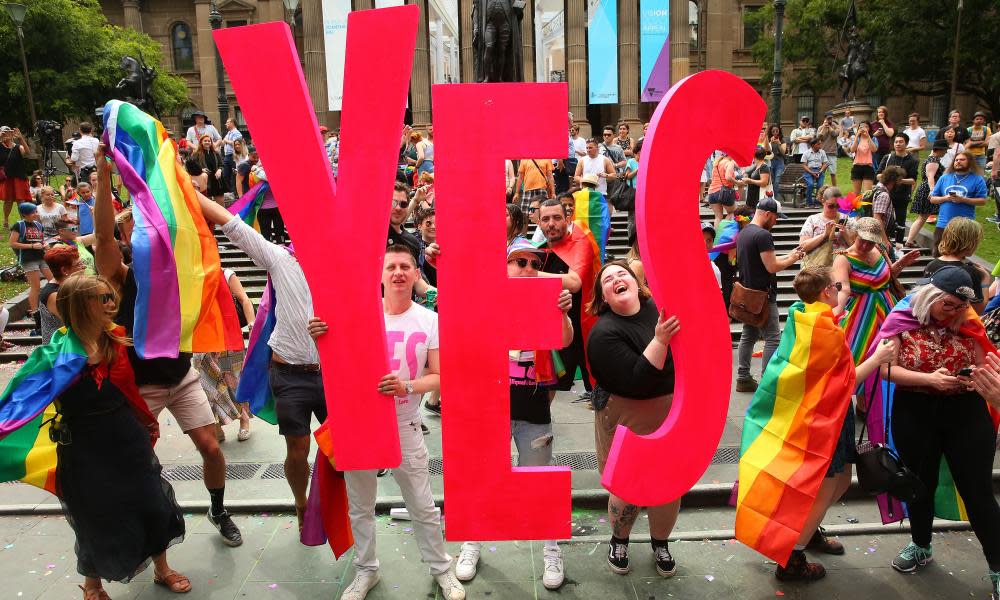Same-sex marriage bill does not hinder religious freedom, says Turnbull

The cross-party bill to legalise same-sex marriage “does not impose any restrictions on religious freedoms at all”, Malcolm Turnbull has said in the clearest sign yet he believes few if any amendments are needed.
But the finance minister, Mathias Cormann, has reiterated his call for changes including allowing civil celebrants to reject weddings, ensuring charities are not adversely affected and protections for “freedom of speech and religion”.
On Friday Cormann told Sky News that he and immigration minister, Peter Dutton, are “as one” on the need for amendments and also supported his proposal that if religious freedom is not protected when the marriage law is changed it could be considered separately next year.
Turnbull told 3AW that the bill, which was drafted by Liberal senator Dean Smith out of recommendations from a cross-party Senate committee, “does not impose any restrictions on religious freedoms at all”.
“Australians practise their religions with freedom, as we always have done and always will,” he said.
Explaining the bill’s provisions, Turnbull said churches and ministers of religion can refuse weddings, as they are able to now for any reason, and facilities owned by churches will be able to decline to service receptions.
He said it made “no change to anti-discrimination laws”, adding that he “totally disagrees” with Kevin Andrews statement that a Muslim baker should be able to refuse to provide services to a Jew.
“We’re not about to be creating new levels of discrimination,” Turnbull said. “And I don’t think changes like that will actually be proposed in the debate.”
“Where it is unlawful to discriminate against people because of their sexual orientation, in terms of a commercial relationship like that, you talked about a baker or a florist, that situation, that law is not affected by this bill.”
Turnbull said it was incumbent on those proposing amendments to “set out precisely what they want to achieve”.
Asked if the postal survey had been hurtful, Turnbull said that “people have said that” and acknowledged “if somebody says that they’ve been hurt by the debate, then they’ve been hurt”.
Turnbull said the debate had been “overwhelmingly positive” and had provided greater affirmation to LGBTI people than a parliamentary debate would have.
“If you are a young gay person and you’re worried about what your parents think, your friends think, isn’t this a remarkable affirmation of love and respect?”
Turnbull noted that the biggest no votes in the survey were in areas with “large migrant populations”, particularly those with “a large Muslim population” in western Sydney and Labor MP Maria Vamvakinou’s seat in north-west Melbourne.
Cormann told Sky he wanted to “expand protections for celebrants beyond religious celebrants”, echoing an amendment proposed by the attorney general George Brandis, and to ensure that “charities are not adversely affected”.
The finance minister said he hoped some of the issues of “freedom of speech and religion” would be reflected in the marriage law changes because they may be able to secure majority support with “a lot of goodwill in the Senate, across the political spectrum”. But he said other changes “may be a matter for another day”.
Cormann refused to say if a separate religious protection bill were initiated next year whether Coalition members would have a conscience vote, saying the question was “getting way ahead” of the current debate and it may be that the marriage law changes satisfy everyone.
On Thursday Labor leader, Bill Shorten, said that the opposition would “look at the religious beliefs of celebrants” to make sure that a marriage bill has “no unintended consequences for them”.
Australian Marriage Equality co-chair, Alex Greenwich, said the yes campaign supported the bill in its current form and the amendment for celebrants to conscientiously object seems “unnecessary”.
The director of legal advocacy at the Human Rights Law Centre and co-chair of the Equality Campaign, Anna Brown, said the cross-party bill is already the “middle ground” in balancing the rights of marriage equality and religious freedom.

 Yahoo News
Yahoo News 
